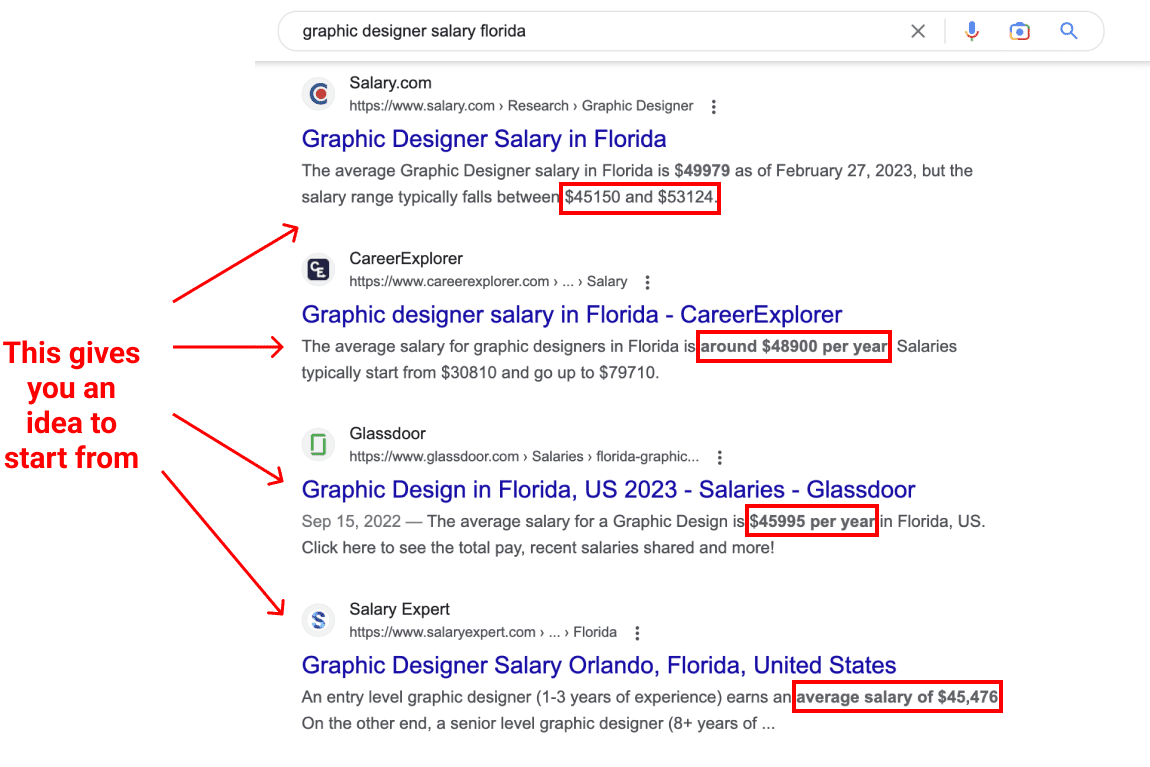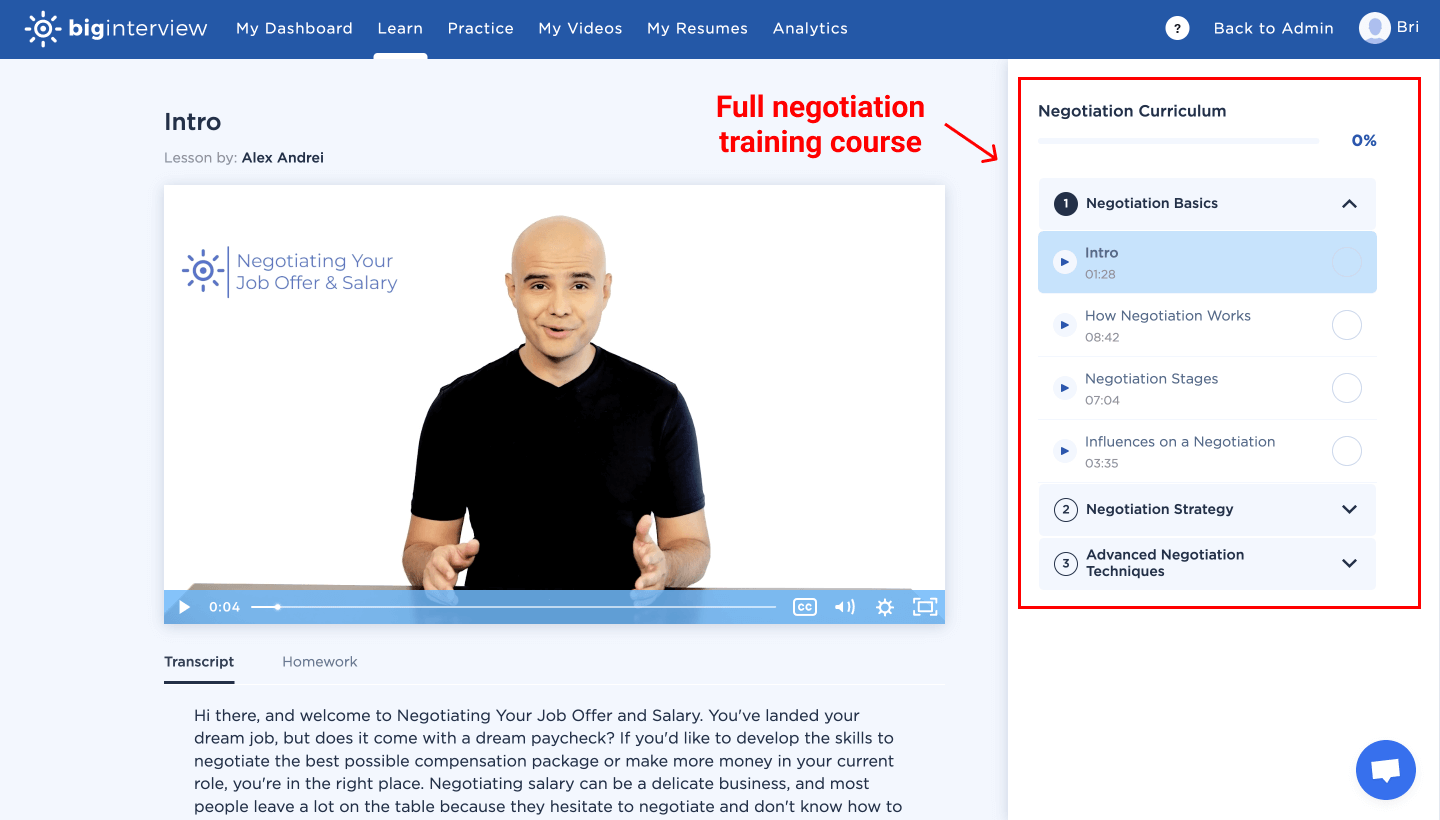A few years ago I found an amazing candidate, let’s call her Jan. She had a much richer experience than the candidates I normally interviewed.
She was the perfect fit to boost my team of Juniors — I couldn’t wait to scoop her up.
But when I asked about her salary expectations, Jan severely undercut what I was willing to pay. It put me in an awkward situation because according to company policy, I needed to stick to this offer.
And because of her low ask, she started with the same salary as everyone else we hired. Even though we would have happily paid more. Don’t be like Jan.
You will be asked what your salary expectations are. Your employer needs to know if they can afford you and you need to know if you can afford to work there. So you need to be prepared!
In this article, we’ll cover:
- The basics of answering the salary expectation question (including how not to undersell yourself)
- 3 templates to answer this question with confidence
- 4 tips to get the salary you deserve
Want to get an offer after every interview? Our interview prep tool will guide you through all the questions you can expect, let you record and analyze your answers, and provide instant AI feedback. You’ll know exactly what to improve to turn your next interview into a job.

Our users land jobs 4 to 5 weeks faster than the national average. Get ready for your interview now.
How to Answer “What Are Your Salary Expectations?”
- Research the standard pay for a similar role in your location.
- Learn how much people in similar roles make.
- Try to find how much the company pays people in your prospective position.
- Honestly asses A) what the absolute minimum salary for you is, and B) what salary you’d consider actually *competitive*.
- Communicate honestly during the interview.
There are two parts that go into answering this question: before and during the interview.
Research your answer before the interview
Here’s how to find your salary range:
If you skip this step, you will surely end up in Jan’s situation.
Instead, ask yourself “Do I know what the typical salary is for this job role and how to adjust it based on my experience?”
If that answer is a “no” or even a “maybe not,” stop reading this article and fire up your search engines.
Here’s a good process to find an ideal salary range for you:
1. Research the standard pay for a similar role in your location.
This is pretty straightforward, you can do this through glassdoor, google, or industry-specific communities in your area (e.g. LA Marketers, Paris Growth Hackers, Denver Agile Developers, etc.).

2. Learn how much people in similar roles make.
This can also be through communities or your own network.
For example, when I was looking for an ideal salary range for my job I went to two places:
- A content community — I had been a part of one specific community for a while, so I searched through group discussions to find mentions of salaries. This specific community also published reports on salary changes every year, so I checked that out.
- I asked a friend of a friend — I knew someone working for a software company in the same area that recently added a new hire to their content team. So I contacted our mutual friend and asked if she would mind connecting us. She was able to give me a crystal clear picture of what they would pay for someone with my experience.
Pro tip: Once you have this info, make sure to compare it to the location info you found in the previous step! This should give you a decent range to start from, then you can use the next two steps to narrow it down.
3. Try to find how much the company pays people in your prospective position.
Glassdoor will be your best friend. It’ll give you a good idea of what the company has paid in the past.
Your specific situation might be different — now is the time to adjust accordingly.
For example, if you see they hired a previous manager at 84K, you could do some light LinkedIn stalking to see how much experience previous managers had and where your skills differ.
Keep these things in mind:
- Years of experience
- Past responsibilities
- Education
- Languages spoken
- Job-specific hard skills
This can all be found on a LinkedIn profile, so take advantage!
You might think these are insignificant details, but they can make a big difference. If the previous manager had more years of experience than you did but never led a team, didn’t have skills that can move some previously outsourced work in-house, or didn’t speak a language that is often used in the day-to-day, this will count!
4. Honestly asses A) what the absolute minimum salary for you is, and B) what salary you’d consider actually *competitive*
You know how much you need to live comfortably. You absolutely shouldn’t undersell this unless you know you’ll be taking a huge pay cut and have financially prepared for this.
On the flip side, you should accept a salary that you consider competitive (i.e., what’s the salary that would make you consider this job over an otherwise solid fit for you).
Both you and the potential employer don’t want you to feel like you’re doing them a favor — make sure your salary reflects that.
In case you give a range and the interviewer rejects it and provides a counteroffer, see how to react in the video below:
Communicate honestly during the interview
Ultimately, the best answer is an honest one. But there are a few ways you can communicate this, depending on your current situation.
Here’s how you would answer the salary expectations question in the three most common situations:
Situation 1: You’re out of work and you need this job.
You don’t need to (or even shouldn’t) express this to the interviewer, but you still need to get your bills paid. In this case, it’s best to go with a salary range based on your research or a middle-of-the-road offer.
Salary expectations answer example
An answer like this shows that you’re open to budging if needed, but still puts you in a good position within the range.
Situation 2: You have a job but are casually looking for new opportunities.
Here you can give a range. You still have a steady income coming in, but you want to reach the highest salary potential possible.
To do this, reiterate the value you bring to the table (based on the research you did in the previous step) and say what your salary range is.
Pro tip: Chances are higher that you’re underselling yourself. It’s fine to go a bit beyond the salary range you found in your research — this helps you get the salary you deserve.
Salary expectations answer example
Situation 3: You’re happy with your current job and are being poached.
You have most of the power here — the company probably did a good amount of research on you and is looking for someone with your specific skill set.
In this case, you can give a flat number or a range that would make this offer a game-changer.
Salary expectations answer example
These were just a few examples depending on your situation, but there are a few templates you can steal below.
Also, it’s important to remember that this article is focused on how to answer the salary expectation interview question (usually asked at the beginning of the hiring process).
If you want to see how to handle the salary negotiation (final steps of the hiring process), we have a full lesson on this.

If you want to check it out, we created a free lesson sneak peek on how to negotiate your salary to get you started!
And here are 5 important things to consider before you accept a job offer.
Templates for Answering The Salary Expectations Question
Now that we covered all the key elements to prep for this question, here are additional templates you can use on the interview day.
Template answer #1
Why we like it: This is the go-to. You explain your reasoning, highlight your skills, and give a range. And depending on your situation, you can make this range tighter or broader.
Template answer #2
Why we like it: This one works best in the situation where you really need a job, and don’t have much room to be picky. This way you’re leaving it up to them, but still basing it on the current market and seniority level.
Template answer #3
Why we like it: In addition to the research, this answer clearly displays the candidate knows their worth and knows what they would consider. It’s simple and straightforward for the interviewer. Plus, they straight forward ask how they feel about that to gauge if it’s possible and open up a further conversation if needed.
These were all examples for the salary expectation question, but we have a full article on the rest of the most common interview questions if you’d like examples for more questions you’ll get on your next interview.
And if you want to learn how to use the “accusation audit” to easily prepare for salary negotiations, check out this video:
Additional tips for talking about your salary expectations
Here are a few last tips to help you nail the salary expectations question:
- Bring up the specific skills they are looking for. This is the biggest tip to avoid ending up like Jan from the intro. If you specifically state the skills they are looking for that you mastered, they’ll easily be able to connect this with your value.
- Flip the question. This works if you didn’t get good info in your research. Some positions keep very quiet about salary and some roles have huge salary ranges (that depend on too many things to count). In this case, you can tell them that you are interested to learn what they had in mind when budgeting for this position. When they tell you, you’ll be expected to say if the salary they suggest is fine with you.
- Emphasize that salary isn’t your only consideration. You need to talk about salary to ensure you’re both on the same page. But don’t forget about your other deal breakers. Feel free to add something at the end of your answer about what else you’re looking for, such as how the job fits into your overall career development, what the company culture is like, and what the work-from-home options are.
- Say you’re open to negotiation. If you’re really afraid to price yourself out of a job you love (and would accept a lower salary for), you can mention that you’re open to negotiate the number you had in mind. But I wouldn’t do this unless you are afraid of pricing yourself out.
In case the job ad didn’t contain the salary and the interviewer didn’t mention it either, here’s how you can bring it up:
How to Answer “What Are Your Salary Expectations?”: Popular Opinion vs. Expert Advice
This question is probably the most uncomfortable one for job seekers. So I decided to check out popular forums to see what people are saying and if their advice is any good. Turns out, it’s a popular topic, people are opinionated, and there’s a bunch of wildly different pieces of advice to choose from.
“The answer to give them is: I am looking for a competitive market salary. Keywords: Market… You aren’t looking for anything stupid. Competitive… You value your skills and want to be compensated in line with that.”
In the same thread, mikedashunderscore said:
“My salary expectation is that you’ll offer me the highest possible salary that everyone on your end agrees is fair for the value you believe I’d bring to the organization… and then I’ll either take it or leave it.
… and that’s my plan for next time. Seriously, after screwing myself into several lowball offers throughout my career, I’m done dancing around the topic. It might be different for you as a new grad, but it shouldn’t be.”
Career expert comments:
Funny that these people “don’t want to dance around the topic” of salary expectations, yet that’s exactly what they’re doing.
By giving such vague answers full of buzzwords that have little meaning, they’re putting all the power into the recruiter’s hands. And you don’t want to be a passive participant in the negotiation process.
So instead of relying on others to assess what’s fair for the value you’d bring, or leaving it up to them to tell you what’s a competitive market salary, do your homework before the interview. Demonstrate your value (by bringing up key achievements or skills), and suggest a specific range you find appropriate (research the industry standard, ask around, take into account your location and seniority).
This way you’ll have a starting point for negotiation, instead of wasting time throwing the ball in their court.
I really don’t understand the value in giving an X to Y range. They’re just going to run with the lower number. If there’s any way to avoid giving a number first that’s the best bet, but if you have to, overestimate as much as you can without being insulting.
Career expert comments:
This is a pretty common piece of advice: don’t give the number first. But it doesn’t make much sense.
Even if you succeed and they’re the ones who have to give the number first, who can guarantee that that number won’t be low?
So you can definitely propose the number and give your X to Y range. If you’re afraid they’d run with the lower number, make that number higher than what you’re earning now, and make it what you’d be comfortable with. That way, even if they go with it, you’ll still be at an advantage.
Of course, it will depend on the situation you’re in. If you have room to be confident, then give them a higher number. On the other hand, if you really want to work there and don’t want to price yourself out of the running, a range is better, and you can negotiate from there.
Kiseido proposed their answer:
I am new to the area and not as familiar with local pay rates as I would like, what sounds reasonable to you?
Career expert comments:
Whatever you do, don’t say this! It reflects several things: you not doing your research, you not being interested in things that affect you, and you not taking initiative. And not only does this answer reflect a complete lack of effort on your side, it also leaves all the power in the employer’s hands.
Perhaps this candidate wanted to follow that outdated advice of not giving the number first, but this answer is ludicrous. So learn from this example and remember that you need to research the local pay rates and industry and role averages before the interview. Take the matter into your own hands and come prepared.
How you approach this interview question might be an indicator of how you approach problems at work — so be resourceful and strategic when answering.
People will say to deflect the question as much as possible. Awful advice from people who probably don’t interview a lot.
Unless it’s FAANG where I already know the pay band for my level, I get salary expectations out of the way in the first few minutes of a recruiter call or 1st point touch with hiring so no one is wasting anyone’s time.
No point in interviewing for Xk when your requirements are Yk.
Career expert comments:
Yes! The only way for you to do the right thing is to be upfront and provide the range when they ask you. That way, you’ll know right away if it even makes sense to continue with the process.
You wouldn’t want to go through 2+ rounds of interviews, plus an assignment, only to realize they’re willing to pay much lower than you deserve. Interviewing is a 2-way street and you’re allowed to have your requirements and actively partake in the negotiation process.
Key Takeaways
Questions about salary can be extremely nerve-wracking, put you in some uncomfortable situations, and put you at risk of accepting a smaller salary than you deserve.
But the tips and templates we covered today will give you everything you need to be prepared (and avoid ending up like Jan).
And by the way, as for Jan, we ended up adjusting her salary 6 months after she was hired and I promoted her about a year after she was hired. So all good there.
But if she had done these few things in the first place, she would have started with the adjusted salary:
- Do research about the company, position, and location beforehand.
- Know, own, and mention your skills along with the number.
- Adjust your answer based on your current situation.
- Give a confident answer that shows you considered all of the points above.
______________________________________________
Need a hand? There are 2 ways we can help you:
